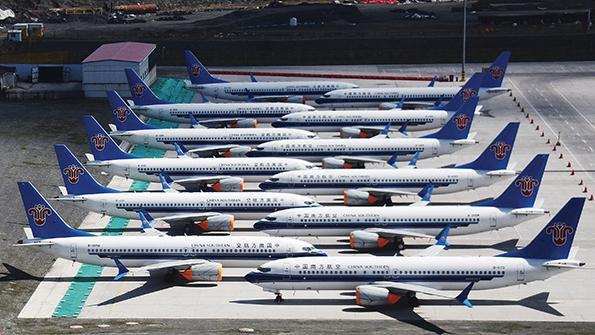Airbus, Boeing China Airline Orders Backlog Shrinking

This is an abbreviated version of the article “Lack Of China Orders Emerges As Threat For Boeing, Airbus” by Jens Flottau and Sean Broderick from Aviation Week & Space Technology.
Find out more about becoming an Aviation Week & Space Technology subscriber here.
In past years, whenever Boeing and Airbus highlighted how bright the future looked and how vast the growth opportunities were going to be, they would point east. As the number of Chinese middle-class travelers grew, the country’s airlines would buy lots of aircraft. As the Asian market continued to grow—and China’s in particular—the aviation center of gravity would shift eastward.
Although one-fifth of the airliners produced during the boom years of the 2010s were delivered to China, deliveries have virtually stopped and orders are shrinking as airlines around the world struggle with the COVID-19 pandemic’s fallout. While Boeing and Airbus have been open to delivery deferrals, they have generally resisted order cancellations when possible to protect comfortable backlogs. In the case of China, however, there is not much left to protect to provide much comfort: Backlogs with both manufacturers are declining fast. And new commitments, which at least Airbus had hoped to conclude in 2021, are looking increasingly unlikely in the short term, if not the medium term.
- China Order Backlogs Decline With No New Deals In Sight
- Airbus Upgrades Tianjin For A321neo Production
- Boeing Hopes For 737 MAX ReCertification By Year-End
As both Boeing and Airbus try to climb out of the current delivery hole, China will not be the massive supporting factor that both have been used to.
Both recognize the issue: “If we can’t move airplanes into China, which is 25% of global growth in the next decade, our global leadership is going to suffer,” Boeing CEO Dave Calhoun told Aviation Week in June (AW&ST, June 14-27, page 46).
Beyond industry specifics, politics are “a big factor”, one executive says. Given the tensions between the U.S. and China “there is no chance for Boeing to get an order soon and it does not look great for Europe either. Some [political] statements have upset the Chinese,” he says. The advent of the C919 – to be first delivered to China Eastern before the end of the year – is not seen as a major factor for the time being, given that production rates are going to be negligible for several years and Chinese airlines appear to be less than enthusiastic to take the aircraft anyway.
Boeing's Commercial Airplanes unit posted an operating loss of $693 million, about half of its 2020 third-quarter loss. Commercial revenues rose 24% to $4.5 billion, thanks largely to 737 MAX deliveries, which did not start again until late in the fourth quarter 2020.
Near-term financials will get a boost from a 777 program change that will accelerate freighter production, the company said "Given continued strength in freighter demand, we have coordinated with our supply chain and are increasing 777 freighter production capacity in the near term," Calhoun says. "We now expect 2022 777deliveries to be relatively in line with 2021." Boeing delivered 20 777s in the first nine months of the year.
Boeing's 777 production rate is at about two per month, including 777-9s that are not certified. The change means Boeing will be producing more aircraft it can deliver now--the freighters--as the 777-9 certification effort and production ramp-up continue.
Calhoun said Boeing remains confident that deliveries of the newest 777 variant will start in late 2023.
Airbus for its part delivered 424 aircraft in the first nine months of the year, a 24% increase over the 341 reached in the same period last year. These include 34 A220s, 341 A320 family aircraft, eleven A330s, 36 A350s and two A380s. To reach its annual target, Airbus has to deliver around 180 aircraft in the final three months of the year.
Revenues in the commercial aircraft segment rose by 21% to €24.6 billion and Airbus managed to turn a €2.4 billion operating loss in the first nine months of 2020 into a €2.9 billion profit this year.




